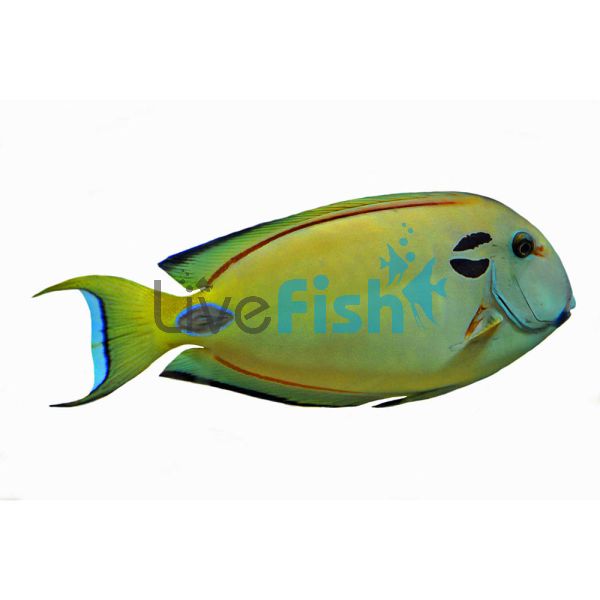Double Line Tang - Medium
The Double Line Tang is an attractive tank member. Adults have a stylish colouration that is more subtle than some Acanthuridae. Aquarists purchasing juveniles can observe the colouration change that occurs as they mature.
Double Line Tangs
Double Line Tangs undergo a colour transition as they develop into adults. Juveniles have a yellow/gold body colour with a black ring around their eye. As they become adults, they develop 2 black bands above the pectoral fins. Hence the names Double band or Lieutenant also identify this species. The caudal peduncle at the base of the tail has a distinctive black spot circled in blue. Blue trimming is also visible on the end of its tail fin.
There is limited information about captivity breeding. In the wild Double Line, Tangs release sperm and eggs into the sea. Larvae are pelagic, they develop for around 7 weeks before returning to the reef.
There is a number of areas in the Indo-Pacific region that Double Line Tangs inhabit. Distribution spreads across the East African coast, Madagascar, Malaysia, Indonesia, and Thailand. They live around rocky areas and reef slopes, usually to a depth of around 35 metres.
Tank Recommendations for Double Line Tangs
Tank size should be 180 gallons (681 litres) or bigger.
Double Line Tangs are reef safe and can also join a fish only aquarium. They need a tank with plenty of Live Rock. This provides grazing opportunities and places to sleep or shelter. A large amount of open space for swimming needs to be available.
There should be at least one area of the tank that has strong water movement. Water oxygenation is also important for this species.
Suitable Tank Buddies
Double Line Tangs are semi-aggressive. They show aggression to conspecifics, but don't make many problems with other fish. It is also possible to house them with larger more aggressive fish
Usually Compatible
Double Line Tangs aren't a threat to corals or invertebrates and can house with a wide variety of fish. Suitable tank buddies include Angels, Basslets, Damsels, Gobies, Puffers, Triggers and Wrasse.
Sometime Compatible
It is possible to house Double Line Tangs with other types of Tang if there are no similarities. But, attempting this will need monitoring. Introducing a variety of Tang's at the same time is better than adding one to an existing group. Care should also be taken when housing Tangs with Batfish, Rabbitfish and Sharks or Rays.
Rarely Compatible
Tangs will show aggression to conspecifics. Pipefish and Seahorses are too delicate to co-habit in the same tank.
Feeding Your Double Line Tangs
Double Line Tangs are omnivorous. They are not particularly fussy eaters once settled in an aquarium. A varied diet should include meaty foods of the fresh or frozen variety. Good examples include Brine Shrimp, Mysis Shrimp and Krill. It is important to provide them with a large number of algae and plant-based products. Double Line Tangs will graze on Live Rock in the tank but usually need extra marine algae in their diet. Seaweed such as Nori can be attached to an area of the tank with a clip. They will also eat flake foods, pellets, and products such as Seaweed Salad. Tangs need to be fed 3 times or more per week.
| Scientific Name | Acanthurus tennenti |
|---|---|
| Care Level | Moderate |
| Common Names | Double Line Tang, Doubleband Surgeonfish, Lieutenant Surgeonfish, Spinecircle Tang, Tennenti Tang, Vampire Tang, Urkos Tang and Lieutenant Tang. |
| Diet | Omnivore |
| Fish Family | Acanthuridae |
| Lifespan (years) | 27 |
| Max. Length (cm) | 26 |
| Min. Tank Volume (l) | 681 |
| Origin | Indo-Pacific, East African coast, Madagascar, Malaysia, Indonesia, and Thailand |
| Reef Safe | Yes |
| Sociability | Semi-aggressive |
| Venomous | No |
| Water Conditions | 22.5-25.5°C (72-78° F), dKH 8-12, pH 8.1-8.4, sg 1.020-1.025 |




